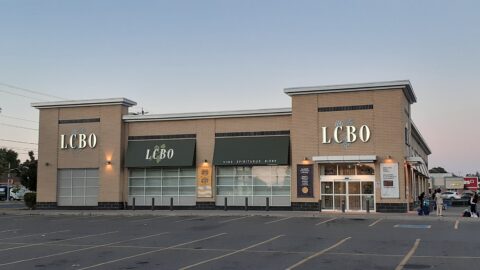World War Two
Published 13 Jul 2024Japan is aware that soon enough the Allies will invade the Home Islands, and they will mobilize absolutely everything and everyone they can for their defense plan, “The Glorious Death of the 100 Million”. In the meantime, Allied carrier forces keep hitting them, the Australian advance on Borneo continues, the Chinese advance on Guilin continues, the Allied rebuilding of Okinawa continues, and American preparations are nearly complete for a test detonation of an atomic bomb.
(more…)
July 14, 2024
Japan’s New Defense plan, 100 million dead – WW2 – Week 307 – July 13, 1945
When the Ontario Progressive Conservatives backed away from LCBO privatization
In the National Post, Terence Corcoran posts an excerpt from last year’s The Harris Legacy: Reflections on a Transformational Premier edited by Alister Campbell:

“LCBO at Parkway Mall” by Xander Wu is licensed under CC BY-SA 4.0 .
Almost 30 years ago, in 1995, the Ontario Progressive Conservative government led by Mike Harris promised to privatize the Liquor Control Board of Ontario (LCBO). “We will sell off some assets, such as the LCBO,” said the party’s famed election document, the Common Sense Revolution (CSR). The LCBO could have been a true privatization — a full-fledged divestiture of a government monopoly into a new open and competitive market, but it never happened.
The failure to privatize the LCBO, lamentable from a consumer and economic perspective, remains a significant lost opportunity to demonstrate the benefits of privatization. If Harris had successfully de-monopolized the alcohol market, the whole concept of privatization would have been given a major boost. Instead, the government backed away from privatization of the alcohol market, preferring instead to allow the corporation to substitute modern marketing and retail razzle-dazzle to give the false impression it was offering the public the best of all worlds.
The LCBO failure is also a demonstration of the degree to which the Common Sense Revolution’s starting principles fell short in grasping the essential benefits of private versus public ownership and control. Neo-liberalism isn’t exactly a fine science. The Wikipedia entry on “Neo-liberalism” is a 30-page effort (including 400 footnote links to hundreds of warring academic papers), reflecting an economic and ideological scramble that dates back more than a century. But when the Harris government came to power, major elements of the free-market model were often overshadowed by fiscal policy objectives. With the LCBO, the Harris government veered off the neo-liberal course in pursuit of standard political objectives.
In 1995, the LCBO was a government owned and operated province-wide corporation that controlled liquor and wine wholesale and retail markets. Another private monopoly player, the Beer Store chain, while owned and operated by the brewing industry, was also essentially a government-sanctioned beer monopoly. The CSR neo-liberal objective should have been to privatize the alcohol market by selling the LCBO, deregulating the Beer Store monopoly and allowing beer sales through supermarkets and even corner stores. More importantly, dismantling the LCBO would allow other corporations to enter the alcohol retail business and provide consumers much more choice, which has been the Alberta experience. Notably, Alberta achieved a successful and deregulated approach without sacrificing provincial revenues.
The neo-liberal objective of privatization is to benefit consumers and enhance economic productivity through competition. Instead, the Harris government fell into the fiscal policy trap that routinely captures politicians, bureaucrats and corporate insiders. Instead of aiming to benefit consumers, the objective soon became how to maximize the fiscal return to government. Never mind the consumer and the market. The objective became preserving — and enhancing — government revenues.
At the time, anti-privatization advocates frantically pointed at the Alberta experience of privatization of their provincial liquor monopoly, which (briefly) generated a lot of retail horror stories that Ontario newspapers gleefully republished (and, likely, emphasized out of proportion to the actual Alberta market). You can still hear Ontarians casting aspersions on the Alberta market as if nothing at all had changed after the initial rough patch. From what I’ve heard from Albertans, they have far wider choices of alcoholic beverages in stores much more conveniently sited with better open hours than anyone in Ontario enjoys. The Alberta government still gets at least as much in tax revenues from alcohol sales without needing to be in the distribution or retail business. It doesn’t seem to be the utter disaster that Ontario media portrays it to be … rather the contrary.
Britain’s First Naval Defeat in 100 years – Coronel 1914
Historigraph
Published Sep 26, 2020
QotD: Method acting
Fortunately, pop Wonka is played by Christopher Lee — or, as one of my kids exclaimed, “It’s Count Dooku!”, that being the name of his splendid turn in Star Wars. Lee is having a grand old time at the moment, doing ten minutes in every blockbuster around. My favourite moment in the Lord of the Rings movies isn’t actually in any of the movies, but in one of those “the making of” documentaries that appears on the DVD. It’s the scene where Saruman gets stabbed by Grima Wormtongue, and Lee explains to director Peter Jackson that the backstabbing sound isn’t quite right, because in his days with British Intelligence during the war he used to sneak up and stab a lot of Germans in the back and it was more of a small gasp they made. Jackson backs away cautiously.
Mark Steyn, “Charlie and the Chocolate Factory”, The Spectator, 2005-07-30.



